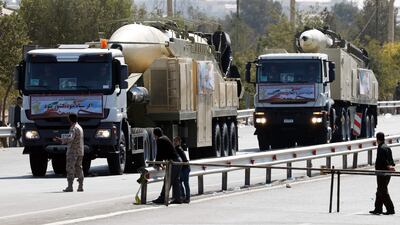Iran’s supreme leader has restricted the range of ballistic missiles manufactured in the country to 2,000 kilometres, the head of the paramilitary Revolutionary Guard said on Tuesday, which limits their reach to only regional targets.
The comments by General Mohammad Ali Jafari to reporters marked the first acknowledgement that Ayatollah Ali Khamenei has imposed limits on the country’s ballistic missile programme.
It also appears to be an effort by Iranian authorities to contrast its programme, which they often describe as for defensive purposes, against those of countries like North Korea, which now uses its arsenal to threaten the United States.
The range of 2,000 kilometres encompasses much of the Middle East, including Israel and US military bases in the region. That has caused concern for the US and its allies, even as Iran’s ballistic missile programme was not included as part of the 2015 nuclear deal that Tehran struck with world powers.
________________
Read more:
Iran boycotts international summit in Abu Dhabi on peaceful nuclear power
Rouhani says Iran will continue to produce missiles
US House of Representatives unanimously passes sanctions on Hizbollah
________________
Speaking on the sidelines of a conference in Tehran, Gen Jafari told journalists that the capability of Iran’s ballistic missiles was “enough for now”. The Guard runs Iran’s missile programme.
“Today, the range of our missiles, as the policies of the Iran’s supreme leader dictate, are limited to 2,000 kilometres, even though we are capable of increasing this range,” he said. “Americans, their forces and their interests are situated within a 2,000-kilometre radius around us and we are able to respond to any possible desperate attack by them.”
Gen Jafari said he didn’t believe there would be any war between Iran and the US, however.
“They know that if they begin a war between Iran and the United States, they will definitely be the main losers and their victory will by no means be guaranteed,” he said. “Therefore, they won’t start a war.”
While keeping with the anti-American tone common in his speeches, Gen Jafari’s comments seemed to be timed to calm tension over Iran’s missile programme.
By limiting the range of its ballistic missiles, Iran can contrast itself against threatening countries like North Korea, as Pyongyang has tested developmental intercontinental ballistic missiles that could potentially reach the US mainland and conducted its most powerful nuclear test to date. Pyongyang also flew two powerful new mid-range missiles over Japan, between threats to fire the same weapons toward Guam, a US Pacific territory and military hub.
The Trump administration already sanctioned Iran for test-firing a ballistic missile in February, with then-national security adviser Michael Flynn warning Tehran that Iran was “on notice”. President Donald Trump’s recent refusal to re-certify the nuclear accord has sent the matter to the US Congress. On Thursday, the House of Representatives voted to put new sanctions on Iran for its pursuit of long-range ballistic missiles, without derailing the deal.
Iran has long insisted its ballistic missiles are for defensive purposes. It suffered a barrage of Scud missiles fired by Iraq after dictator Saddam Hussein launched an eight-year war with his neighbour in the 1980s that killed 1 million people. To build its own programme, Tehran purchased North Korean missiles and technology, providing much-needed cash to heavily-sanctioned Pyongyang.
Also on Tuesday, Iran broke ground at its Bushehr nuclear power plant for two more atomic reactors to generate electricity. State television quoted Ali Akbar Salehi, the head of the Atomic Energy Organisation of Iran, as saying the first new reactor would go online in seven years, while a third would be active in nine years.
Russia will provide assistance in building the new reactors as Moscow helped bring Bushehr online in 2011. It marks the first expansion of Iran’s nuclear power industry since the accord.

